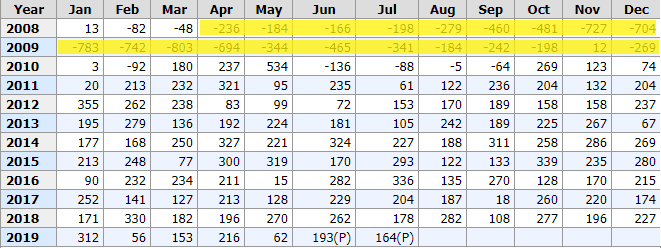Truth be told all presidents say "I believe, I will do "etc etc but not all lie about achievements they had nothing to do with, or things that have never happened. As a liar ,trump is an overachiever all imhoOuch!! I don't recall Obama going around patting himself on the back all the timeAnd yet trump takes credit time and time again for reducing unemployment among blacks latinoes and all people
He 's like the rooster crowing in the morning thinking he's the reason the sun rises
Of course he does, and his followers give it to him just like the Obama ones did for him.
Trump and Obama are not that different and neither are their followers.
Find one of his speeches and take a shot every time he says "I"...see how long you last!
Name one of Obama’s accomplishments that helped the US in his 8 yrs.
/what-has-obama-done-11-major-accomplishments-3306158_V3-5b71e77f46e0fb0050e03103.png)
© The Balance, 2018
BY KIMBERLY AMADEO
Updated June 25, 2019
President Barack Obama entered office in 2009 to fight the 2008 financial crisis. He immediately launched the ambitious Affordable Care Act, despite the backlash. His administration continued battling the Tea Party Republicans after they gained a Congressional majority in the 2010 mid-term elections.
Despite these challenges, he accomplished many great things by the time his term ended in January 2017. Here are the top 14 in chronological order. Find out how they match up to the 2008 "Yes We Can!" campaign promises.
$787 billion economic stimulus package. It cut taxes, extended unemployment benefits, and funded public works projects.
The recession ended in July 2009 when GDP growth turned positive.
LEARN MORE
In just seven months, the American Recovery and Reinvestment Act pumped $241.9 billion into the economy. That increased growth to a robust 3.9 percent rate by early 2010. By March 30, 2011, almost all ($633.5 billion) of the funds were spent.
bailed out the U.S. auto industry on March 30, 2009. The federal government took over General Motors and Chrysler, saving three million jobs. It forced the companies to become more fuel efficient and therefore more globally competitive.
Obama won the Nobel Peace Prize. The Committee lauded "his extraordinary efforts to strengthen international diplomacy and cooperation between peoples." He withdrew troops from Iraq in 2011. He reduced the U.S. nuclear warhead stockpile by 10 percent.
Affordable Care Act revolutionized healthcare. By 2014, the economy benefited from having 95 percent of the population on health insurance.
The greater number of people receiving preventive care reduced the number of expensive visits to emergency rooms.
That slows the rise of health care costs for everyone. That's because Medicaid reimburses hospitals for emergency care. Those are the most significant of Obamacare's 10 advantages.
Why did health care need to be reformed? Rising costs threatened to take over the entire federal budget. It was also the no.1 cause of bankruptcies. In return, Americans received the worst health care in the developed world. It is the only one of 33 developed countries without universal health care.
President Donald Trump promised to "repeal and replace" Obamacare. As of October 2017, he has failed to pass any legislation. But he is weakening Obamacare even without repeal.
Dodd-Frank Wall Street Reform Act improved regulation of eight areas that led to the financial crisis. The Consumer Financial Protection Agency reduced harmful practices of credit cards and mortgages. The Financial Stability Oversight Council regulated hedge funds and banks that became too big to fail. The "Volcker Rule" banned banks from risking losses with their depositors' money. Dodd-Frank clarified which agencies regulated which banks, stopping banks from cherry-picking their regulators.
Dodd-Frank directed the Securities and Exchange Commission and the Commodity Futures Trading Commission. These regulated the riskiest derivatives, like credit default swaps and commodities futures. Dodd-Frank also asked the SEC to recommend how the credit rating agencies, like Moody's and Standard & Poor's, could be improved.
$858 billion tax cut. It had three main components: a $350 billion extension of the Bush tax cuts, a $56 billion extension of unemployment benefits, and a $120 billion reduction in workers' payroll taxes. Businesses received $140 billion in tax cuts for capital improvements and $80 billion in research and development tax credits. The estate tax was exempted (up to $5 million), and there were additional credits for college tuition and children.

